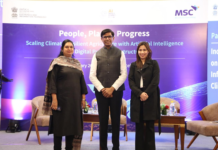At the European Society for Clinical Nutrition and Metabolism (ESPEN) annual conference, the results of research into the perspective of Covid-19 patients on nutritional support across Europe were published.
The research conducted by IPSOS among 453 adult patients who were hospitalized with Covid-19 across the UK, Spain, Italy, France, and Germany, was commissioned by Nutricia, part of the world-leading food, beverage, and nutrition company Danone. The findings reveal the need to integrate nutrition into medical care better to improve Covid-19 patient recovery in hospital and after discharge.
Emanuele Cereda, a physician at the Research Foundation IRCCS Policlinico San Matteo in Italy, has conducted extensive research on nutrition and Covid-19 since the start of the pandemic. He shares his view on the survey findings: “Optimal nutrition care is key to support the disease journey and recovery and can help patients return to doing things that matter most to them. We see many learnings from our experience with Covid-19, particularly the association between reduced energy intake and worse outcomes. Collecting insights from patients complements clinical research and contributes to improving nutritional care for patients recovering from severe illness.”
Weight loss and reduced strength
Two out of three patients surveyed experienced clinically significant weight loss that was associated with a longer stay in hospital. This is consistent with clinical research conducted since the start of the pandemic showing a high prevalence of malnutrition in patients admitted to hospital with COVID-19[1],[2]. Furthermore, patients reported symptoms like loss and change of smell and taste, diarrhea, or difficulty swallowing, which can further worsen nutritional issues.
Muscle loss is a key related issue and a common complication of critical illness, associated with functional disability and longer recovery[3],[4]. As a result of muscle loss, patients are weaker, recover more slowly and experience more difficulty with everyday tasks[5], [6]. Survey participants confirmed this: 85% felt they had lost muscle strength, and 42% felt much weaker than before their illness. The large majority of patients surveyed reported more difficulties with activities of daily life, including climbing the stairs (85% saying their ability to complete this was impacted), food shopping and getting out of bed (76% each), and preparing meals (67%).
Opportunities for better nutritional care in hospital and during recovery
For patients, regaining their strength is a key goal, with 51% citing this as the top expectation from nutritional support. This is closely followed by 45% of people who want to regain the ability to perform usual daily activities. Addressing malnutrition, weight loss, and muscle wasting with nutritional support contributes to a severe illness’s health outcomes. It helps them recover better[7], which is why ESPEN issued recommendations to include nutritional support as an integral part of the management of Covid-19 patients[8].
Cristina Cuerda, physician at the General University Hospital Gregorio Maranon in Spain and General Secretary of ESPEN, is leading a large-scale clinical trial on nutrition and Covid-19 in 16 hospitals in Madrid. She comments: “The clinical research conducted to date highlights that despite the high risk of malnutrition and muscle loss in patients hospitalized in intensive care units with COVID-19, the use of medical nutrition therapy remains inadequate after discharge. This aspect of patient care needs more attention to improve recovery of people who leave the hospital with significant physical impairments.”
The survey results reiterate the benefit of adequate care after discharge – 56% of patients who received nutritional support after leaving the hospital considered that it helped a lot or enormously with their recovery.
Only half of the patients surveyed as part of the research presented at ESPEN received medical nutrition in the hospital during their treatment. On discharge from the hospital, this number dropped to 15% of patients, highlighting gaps in continuity of care after leaving the hospital.
Nutricia’s program on nutritional management for Covid-19 patients
Commenting on the findings of the patient research, Patrick Kamphuis, senior medical affairs director at Nutricia, noted: “In this research, we are hearing directly from the patients themselves about their experience and expectations around nutrition during their Covid-19 illness. Their voices confirm what nutritional experts have been advising since early last year – nutrition is an underutilized area of care for this disease. “
The findings are being presented at the ESPEN Congress 2021 amongst other investigator-led research initiatives supported by Nutricia as part of its Nutricover program. Nutricia’s initiative is to support independent research and contribute to real-world evidence and clinical guidance for the nutritional management of patients recovering from severe Covid-19 infection.
[1] Martin-Martinez. et al. Clin Nutr 2021; S0261-5614(21)00297-1.
[2] Vaillant MF et al. Nutrition. 2021 ;111433
[3] Puthucheary ZA. SIGNA VITAE. 2017;13(3): 30-31
[4] Herridge MS et al. N Engl J Med. 2003;348(8);683-93.
[5] Zanten van ARH, et al. Crit Care. 2019; 23:368.
[6] Hopkins RO, et al. Ann Am Thorac Soc. 2017;14(8):1332-4.
[7] Schuetz et al, Lancet, 2019 Jun 8;393(10188):2312-2321.
[8] Barazzoni et al, 2020, Clin Nutr; 39(6): 1631–1638
IndiFoodBev — authentic, impactful and influential
An English-language food and beverage processing and packaging industry B2B platform in print and web, IndiFoodBev is in its third year of publication. It is said that the Indian food and beverage industries represent approximately US$ 900 billion in revenues which implies more than 20% of the country’s GDP. Eliminating the wastage on the farmside can help to deliver more protein to a higher number of the population apart from generating sizable exports. The savings in soil, seeds, water, fertilizer, energy and ultimately food and nutrition could be the most immense contribution that country is poised to make to the moderation of climate change.
To improve your marketing and grow sales to the food and beverage processing and packaging industry, talk to us. Our research and consulting company IppStar [www.ippstar.org] can assess your potential and addressable markets in light of the competition. We can discuss marketing, communication, and sales strategies for market entry and growth.
Suppliers and service providers with a strategy and budget for targeted marketing can discuss using our hybrid print, web, video, and social media channels to create brand recognition linked to market relevance. Our technical writers are ready to meet you and your customers for content.
The second largest producer of fruit and vegetables in the world is continuously expanding processing capacities and delivery systems with appropriate innovative technologies. We cover product and consumer trends, nutrition, processing, research, equipment and packaging from farm to thali. Get our 2025 media kit and recalibrate your role in this dynamic market. Enhance your visibility and relevance to existing markets and turn potential customers into conversations. Ask for a sample copy of our bi-monthly in print or our weekly IndiFoodBev eZine each Wednesday.
For editorial info@ippgroup.in — for advertisement ads1@ippgroup.in and for subscriptions subscription@ippgroup.in
Naresh Khanna – 10 February 2025
Subscribe Now











